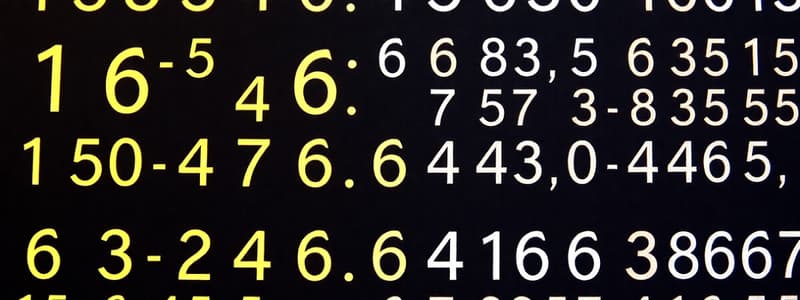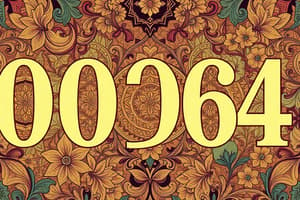Podcast
Questions and Answers
What is the base of the decimal numerical system?
What is the base of the decimal numerical system?
In the Roman numeral 'XV', what is the value of 'X'?
In the Roman numeral 'XV', what is the value of 'X'?
Which of the following numerical systems is based on the position of a symbol within a number?
Which of the following numerical systems is based on the position of a symbol within a number?
In the example of converting 26 to binary, what is the remainder when 13 is divided by 2?
In the example of converting 26 to binary, what is the remainder when 13 is divided by 2?
Signup and view all the answers
What does 'r' represent in the binary conversion example?
What does 'r' represent in the binary conversion example?
Signup and view all the answers
What is the main characteristic of a set?
What is the main characteristic of a set?
Signup and view all the answers
What does uniqueness in a set allow us to do?
What does uniqueness in a set allow us to do?
Signup and view all the answers
In the division method shown, what is the process used to determine?
In the division method shown, what is the process used to determine?
Signup and view all the answers
What is the result of dividing 56 by 2 repeatedly until reaching 0 based on the provided calculations?
What is the result of dividing 56 by 2 repeatedly until reaching 0 based on the provided calculations?
Signup and view all the answers
Why is it important that each element in a set is distinct?
Why is it important that each element in a set is distinct?
Signup and view all the answers
What is the result of the union of a set A with an empty set?
What is the result of the union of a set A with an empty set?
Signup and view all the answers
Which property states that the order of sets in a union does not affect the result?
Which property states that the order of sets in a union does not affect the result?
Signup and view all the answers
If set A is a subset of set B, what is the outcome of their union?
If set A is a subset of set B, what is the outcome of their union?
Signup and view all the answers
Which of the following is a correct statement regarding the intersection of a set with the union of two other sets?
Which of the following is a correct statement regarding the intersection of a set with the union of two other sets?
Signup and view all the answers
What is the result of the intersection of a set with itself?
What is the result of the intersection of a set with itself?
Signup and view all the answers
What is the result of the intersection of sets A and B?
What is the result of the intersection of sets A and B?
Signup and view all the answers
What is the result of the difference A - B?
What is the result of the difference A - B?
Signup and view all the answers
Which of the following sets represents the union of sets A and C?
Which of the following sets represents the union of sets A and C?
Signup and view all the answers
What does the notation A∪B represent in set theory?
What does the notation A∪B represent in set theory?
Signup and view all the answers
Set A is defined as {1, 2, 5, 3}. What is the complement of set A (Ac) if the universal set (U) is {1, 2, 3, 4, 5, 6, 7, 8, 9}?
Set A is defined as {1, 2, 5, 3}. What is the complement of set A (Ac) if the universal set (U) is {1, 2, 3, 4, 5, 6, 7, 8, 9}?
Signup and view all the answers
What is the difference between set A and set B (A-B), given that A={1, 2, 5, 3} and B={1, 3, 8, 9}?
What is the difference between set A and set B (A-B), given that A={1, 2, 5, 3} and B={1, 3, 8, 9}?
Signup and view all the answers
Which of the following statements is true regarding the commutative property of set operations, as shown in the document?
Which of the following statements is true regarding the commutative property of set operations, as shown in the document?
Signup and view all the answers
According to De Morgan's Law, how can the complement of the union of two sets (A∪B)c be expressed?
According to De Morgan's Law, how can the complement of the union of two sets (A∪B)c be expressed?
Signup and view all the answers
Study Notes
Number Systems
- A number system is a set of symbols and rules for representing numbers.
- It is formed from a set of elements and symbols.
- A number system is also a positional system; the value of a symbol depends on its position within the number.
- Numbers in a system can be represented additively or subtractively.
- Each position in the number corresponds to a certain power of the base.
- The base of a number system is the number of digits used in the system.
- Examples of number systems include decimal (base 10), binary (base 2), octal (base 8), and hexadecimal (base 16).
- Converting between different number systems involves using the powers of the base.
- Examples of positional number systems include base 2 (binary), base 8 (octal), and base 16 (hexadecimal).
- Converting between bases involves repeated division by the target base and collecting the remainders.
Studying That Suits You
Use AI to generate personalized quizzes and flashcards to suit your learning preferences.
Description
Explore the intricacies of number systems in this quiz. Learn about different bases such as decimal, binary, octal, and hexadecimal, and understand how to convert between them. This quiz is perfect for students looking to grasp the fundamentals of positional number systems.



